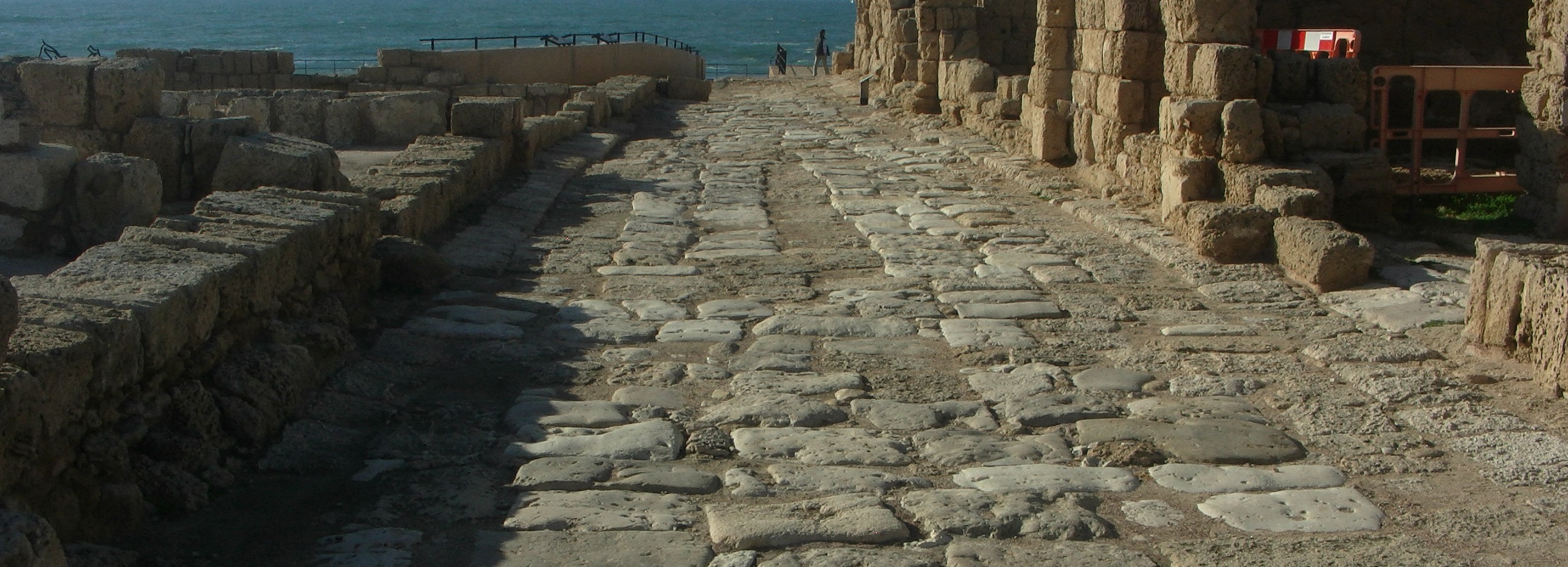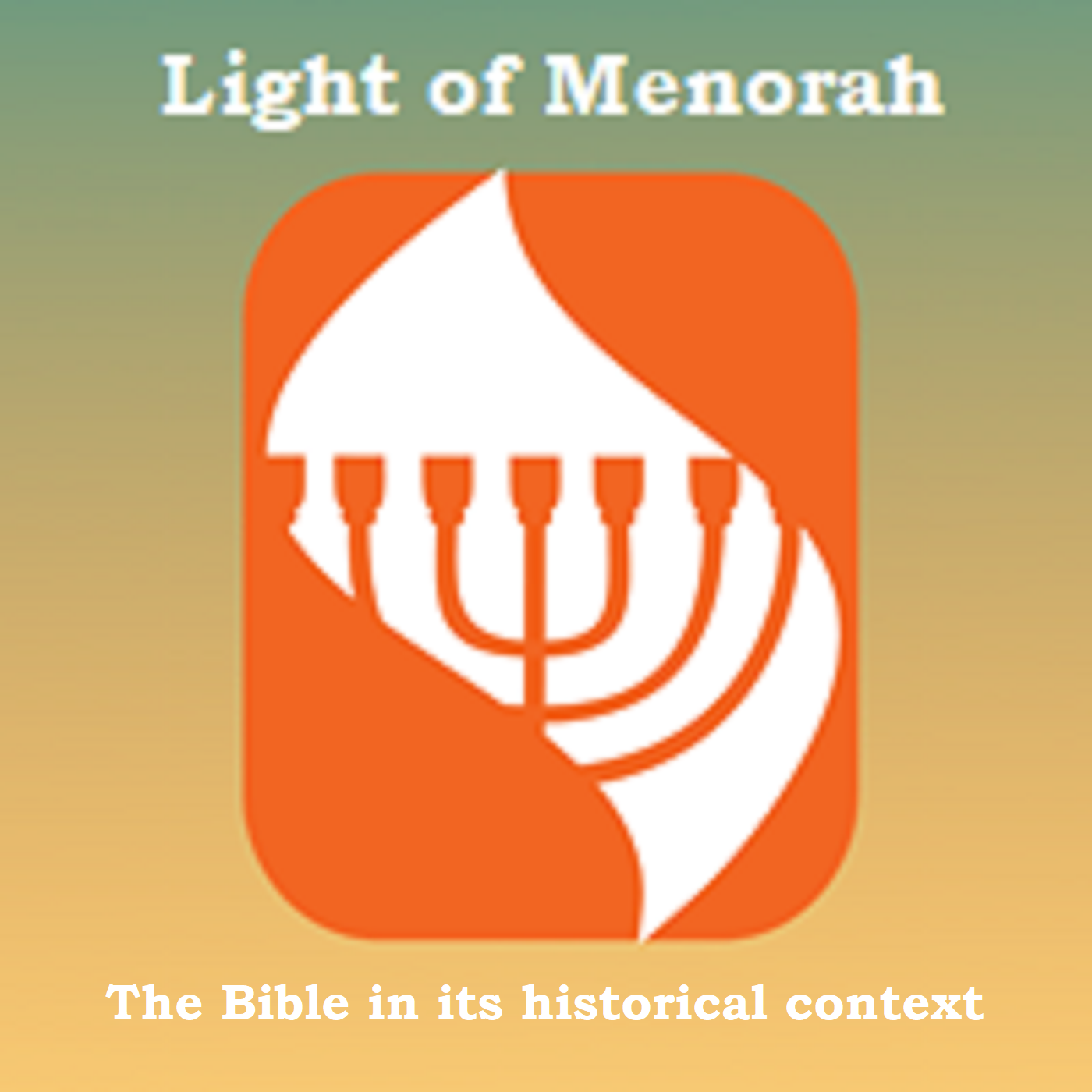
31.1K
Downloads
390
Episodes
The study of the Bible in its historical context - with a focus on the archaeology, history, geography, customs , culture, and even the languages of the ancient Middle East. WE ask what did they understand THEN - the original intent of the Lord - so that we can expand and enrich our understanding NOW and thus become true disciples of Adonai Yeshua as in John 8:31-32.
The study of the Bible in its historical context - with a focus on the archaeology, history, geography, customs , culture, and even the languages of the ancient Middle East. WE ask what did they understand THEN - the original intent of the Lord - so that we can expand and enrich our understanding NOW and thus become true disciples of Adonai Yeshua as in John 8:31-32.
Episodes
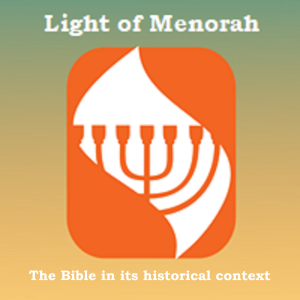
Thursday Aug 10, 2023
Exodus - 47 - Lesson 14 Part 1 - Ex. 20:14 NO ADULTERY
Thursday Aug 10, 2023
Thursday Aug 10, 2023
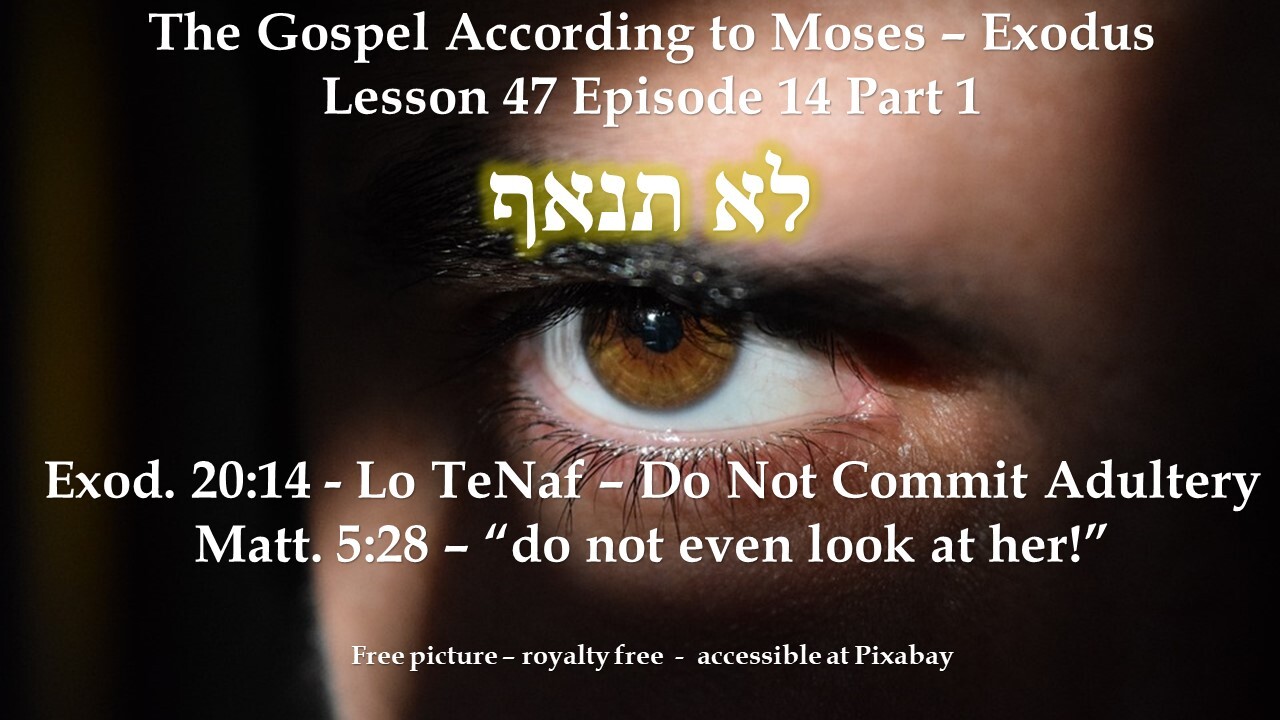
The "play" button is just above this picture - the orange circle with the white triangle.
Rev. Ferret - who is this guy? What's his background? Why should I listen to him? Check his background at this link - https://www.dropbox.com/s/ortnret3oxcicu4/BackgrndTeacher%20mar%2025%202020.pdf?dl=0

Monday Aug 07, 2023
Exodus - 47 - Lesson 13 - Exod 20:13 - NO MURDER
Monday Aug 07, 2023
Monday Aug 07, 2023

We now come to the 6th commandment …
“You shall not murder.” (Exo 20:13 NASB)
“Thou shalt not kill.” (Exo 20:13 KJV)
“You shall not murder.” (Exo 20:13 NKJV)
“Thou shalt not murder.” (Exo 20:13 Jewish Bible)
So for 100’s of years many Christians have stated this commandment as not to kill. Many Christians used the King James translation in an argument that Christians must adhere to pacifism and that Jesus was a pacifist. But, the real Hebrew, the precise Hebrew, is not to murder. This verse cannot be used in any argument for pacifism.
As I mentioned in the podcasts here are some awesome links to related article you may find extremely beneficial in your study.
From the website GOTQUESTIONS.ORG is the article, “What is the difference between ‘you shall not murder’ and ‘you shall not kill’”?
https://www.gotquestions.org/you-shall-not-kill-vs-murder.html
From the website GOTQUESTIONS.ORG is the article, “What does the Bible say about self-defense?”
https://www.gotquestions.org/self-defense.html
From the website GOTQUESTIONS.ORG is the article, “What does the Bible say about pacifism?”
https://www.gotquestions.org/Bible-pacifism.html
From Andrew Holt’s article, “’Thou shalt not kill’ vs. ‘Thou shalt not murder.’”
https://apholt.com/2015/03/17/thou-shalt-not-kill-vs-thou-shalt-not-murder/
Etymology of the word “kill”
https://www.etymonline.com/word/kill
In this podcast we are dealing with murder. This is clearly related to abortion. As I indicated in the podcast I would provide a link to the ancient Christian document the Didache (DI DAC HEE). Here’s the link to the complete ancient document.
Link - https://legacyicons.com/content/didache.pdf
Rev. Ferret - who is this guy? What's his background? Why should I listen to him? Check his background at this link - https://www.dropbox.com/s/ortnret3oxcicu4/BackgrndTeacher%20mar%2025%202020.pdf?dl=0

Tuesday Aug 01, 2023
Exodus 47 - Lesson 12 part 1 - Exod, 20:12 - HONOR GOD & PARENTS
Tuesday Aug 01, 2023
Tuesday Aug 01, 2023

Lesson 12 Part 1
Did you ever stop and ask what does it mean to “honor your parents?” Honor? Does that mean we obey them? If we love our mom and dad is that the same as honoring them? Or something else? On top of that what is this doing here? We’re dealing with an awesome event – the giving of a New Covenant by the Lord to His Chosen Ones at the mountain of God. Just read …
Then the LORD said to Moses, "Write down these words, for in accordance with these words I have made a covenant with you and with Israel." So he was there with the LORD forty days and forty nights; he did not eat bread or drink water. And he wrote on the tablets the words of the covenant, the Ten Commandments. (Exo 34:27-28)
How are our parents connected to this? What’s with this anyway?
Join us in lesson 12 parts 1 & 2. Come and delve into a study of a truly unique commandment of the Lord that He decided was critical for all Israel and us, as true disciples of Adonai Yeshua. Our parents attain a status that no one else in the Bible can attain, ever. It speaks volumes to us of how a good and just and Godly society itself can survive. It focuses on mom and dad.
I also highly recommend the following articles. I provided their links and they will add and enhance your study as we try and figure out how to honor our dads and moms and what this has to do with the good world and a Godly society.
Does the Lord Require me to Honor Evil Parents?
https://lightfordarktimes.com/2020/04/24/does-the-lord-require-me-to-honor-evil-parents/
Must One Honor an Abusive Parent?
https://www.myjewishlearning.com/article/must-one-honor-an-abusive-parent/
Dennis Prager’s Video series on the Ten Commandments
You Don’t Have to Love Your Parents (Dennis Prager)
https://www.nationalreview.com/2014/12/you-dont-have-love-your-parents-dennis-prager/

Sunday Jul 30, 2023
Sunday Jul 30, 2023
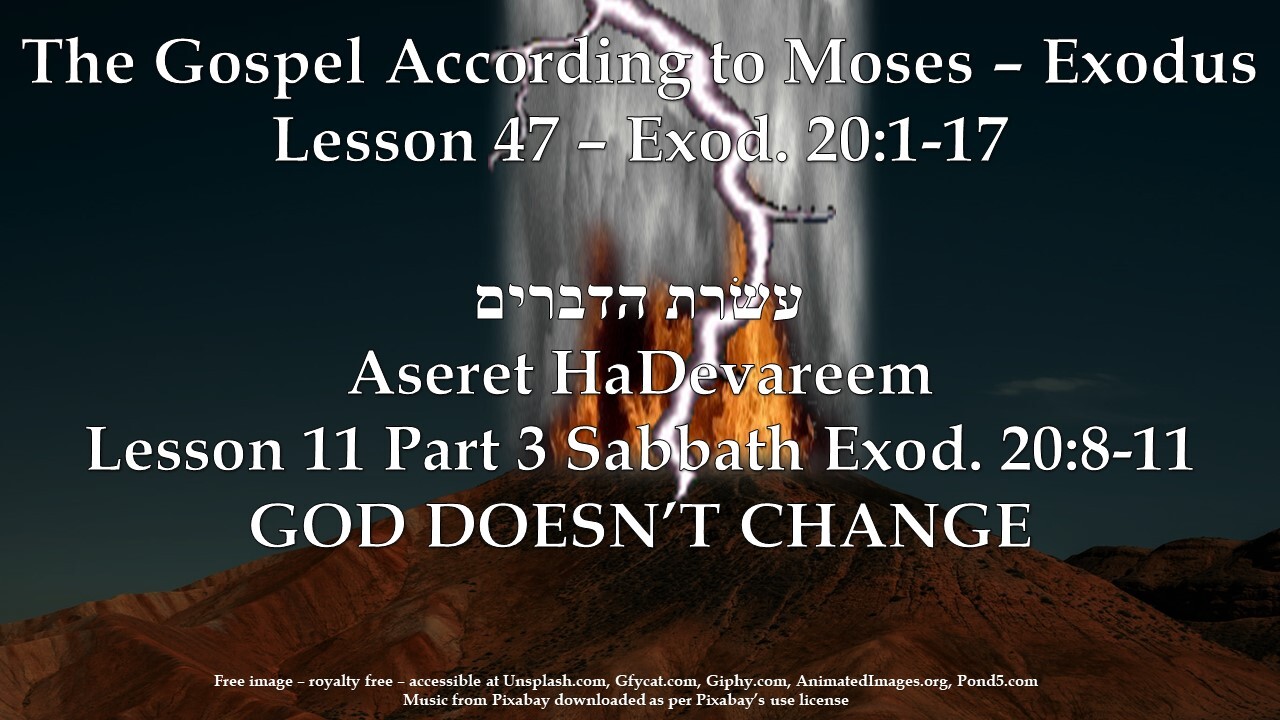
Lesson 11 Part 3
The Bible was clearly meant for those the first ones to hear it. Like the Torah. It was meant for the Hebrews coming out of Egypt. The New Testament was written for the first disciples like John and Mark and Matthew and Paul and Mary. And once we understand what the "first hearers" heard and understood, we then an see how it relates to us. God gave them His word so they understood it and passed it down to us.
The Messianic Jewish believers lived in a Jewish culture 2000 years ago and they perhaps saw things and understood things a lot differently than us. So we will again put the Bible in its historical context. Once again we will study His word taking in account the ancient Jewish culture of those first disciples. When we do and study the GREEK and not the English, we find there is a compelling alternative understanding to verses that supposedly suggest Jesus changed everything. Contemporary theologians say that these verses show that Jesus changed the Sabbath from its Biblical practice to the way the "church" does it today. The three verses we will study are shown below taken from the NASB version. We will study these verses in their historical context. When we do the view that Jesus changed, God changed, is seriously challenged.
VERSE 1 - Now concerning the collection for the saints, as I directed the churches of Galatia, so do you also. On the first day of every week each one of you is to put aside and save, as he may prosper, so that no collections be made when I come. When I arrive, whomever you may approve, I will send them with letters to carry your gift to Jerusalem; (1Co 16:1-3)
VERSE 2 - On the first day of the week, when we were gathered together to break bread, Paul began talking to them, intending to leave the next day, and he prolonged his message until midnight. There were many lamps in the upper room where we were gathered together. And there was a young man named Eutychus sitting on the window sill, sinking into a deep sleep; and as Paul kept on talking, he was overcome by sleep and fell down from the third floor and was picked up dead. But Paul went down and fell upon him, and after embracing him, he said, "Do not be troubled, for his life is in him." When he had gone back up and had broken the bread and eaten, he talked with them a long while until daybreak, and then left. They took away the boy alive, and were greatly comforted. (Act 20:7-12)
VERSE 3 - I, John, your brother and fellow partaker in the tribulation and kingdom and perseverance which are in Jesus, was on the island called Patmos because of the word of God and the testimony of Jesus. I was in the Spirit on the Lord's day, and I heard behind me a loud voice like the sound of a trumpet, saying, "Write in a book what you see, and send it to the seven churches: to Ephesus and to Smyrna and to Pergamum and to Thyatira and to Sardis and to Philadelphia and to Laodicea." (Rev 1:9-11)
To continue your study on the Sabbath I strongly recommend the following books and resources ... (one's with * are a must)
* Kiesz, John. "A History of the Sabbath and Sunday." The Bible Sabbath Association (January 1, 1983). Free download at this link - http://www.truthontheweb.org/KieszHis...
Nichols, J. T. “The Origin of the Hebrew Sabbath.” The Old and New Testament Student, vol. 12, no. 1, 1891, pp. 36–42. JSTOR, www.jstor.org/stable/3157542
* Hay, Malcolm. "THE ROOTS OF CHRISTIAN ANTI SEMITISM." Available at Amazon.
Dr. Shumel Safrai, “The Jewish People in the First Century: Historical Geography, Political History, Social, Cultural and Religious...Vols. 1 and 2.”
* Bacchiocchi, Samule. "From Sabbath to Sunday." (1977) Rome, Italy. Pontifical Gregorial University Press. Free download at this link - http://www.anym.org/pdf/from_Sabbath_...
Encyclopedia Judaica. 1972. Keter Publishing. Jerusalem:Israel.
"Feasts and the Holidays, the Mo’edim." https://hebrew4christians.com/Holiday...
Flusser, David. "Judaism and the Origins of Christianity." 1988. Magness Press. Jerusalem.
Hayyim, Schauss. "The Jewish Festivals." © 1938
"The Jewish Encyclopedia." www.jewishencyclopedia.com
Levine, Lee. 2005. "The Ancient Synagogue: the First Thousand Years." 2nd Edition. New Haven: Yale University Press.
* Stern, David. Jewish New Testament Commentary. 1996. Jewish New Testament Publications. Clarksfield:Maryland.
Stern, David. The Complete Jewish Bible. 1998. Jewish New Testament
* Wilson, Marvin. Our Father Abraham. 1989. W.B. Eerdman’s. Grand Rapids:MI. Contours of Hebrew Thought.
Finally, here's a link to a chapter of one of my books I did for my classes. The content is based upon the sources above. Link - https://www.dropbox.com/s/qdycam9yad7... A second link is related to Paul meeting in Troas on the FIRST DAY OF THE WEEK. Here's the link - https://www.dropbox.com/s/rmkqxbq18k3...
Rev. Ferret - who is this guy? What's his background? Why should I listen to him? Check his background at this link - https://www.dropbox.com/s/ortnret3oxcicu4/BackgrndTeacher%20mar%2025%202020.pdf?dl=0

Friday Jul 28, 2023
Friday Jul 28, 2023
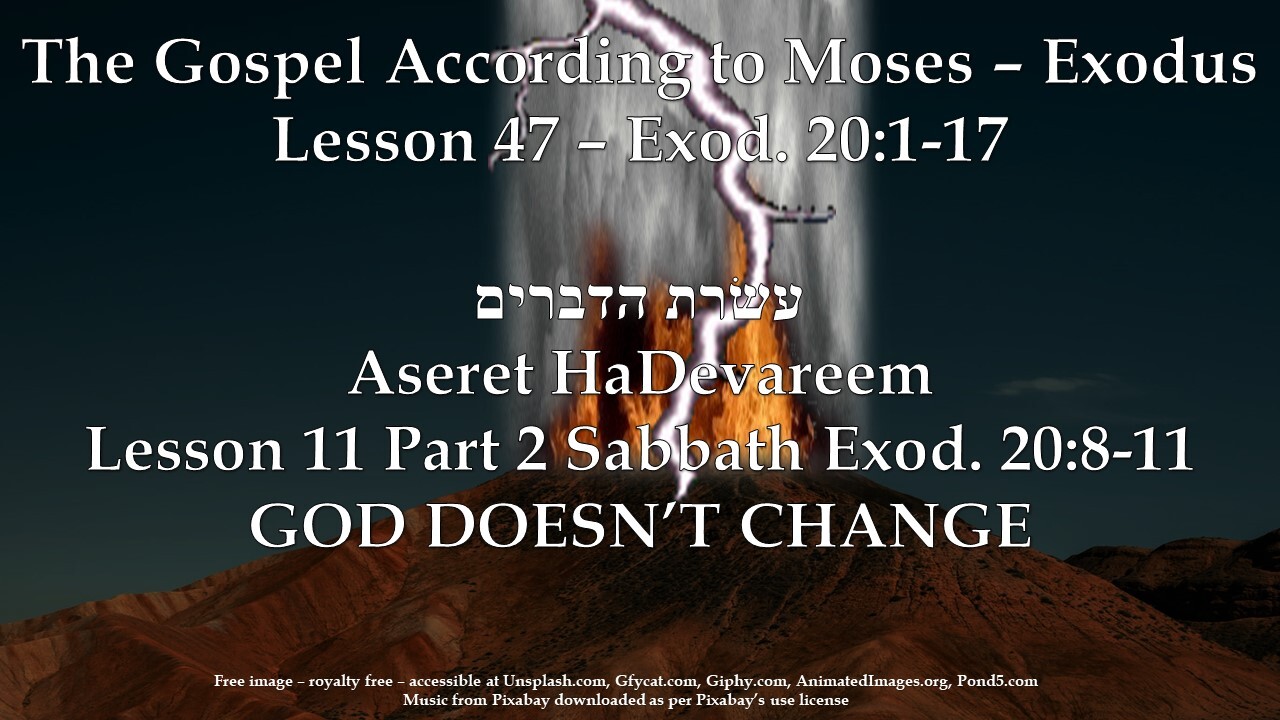
Lesson 11 Part 2
The Bible was clearly meant for those the first ones to hear it. Like the Torah. It was meant for the Hebrews coming out of Egypt. The New Testament was written for the first disciples like John and Mark and Matthew and Paul and Mary. And once we understand what the "first hearers" heard and understood, we then an see how it relates to us. God gave them His word so they understood it and passed it down to us.
The Messianic Jewish believers lived in a Jewish culture 2000 years ago and they perhaps saw things and understood things a lot differently than us. So we will again put the Bible in its historical context. Once again we will study His word taking in account the ancient Jewish culture of those first disciples. When we do and study the GREEK and not the English, we find there is a compelling alternative understanding to verses that supposedly suggest Jesus changed everything. Contemporary theologians say that these verses show that Jesus changed the Sabbath from its Biblical practice to the way the "church" does it today. The three verses we will study are shown below taken from the NASB version. We will study these verses in their historical context. When we do the view that Jesus changed, God changed, is seriously challenged.
VERSE 1 - Now concerning the collection for the saints, as I directed the churches of Galatia, so do you also. On the first day of every week each one of you is to put aside and save, as he may prosper, so that no collections be made when I come. When I arrive, whomever you may approve, I will send them with letters to carry your gift to Jerusalem; (1Co 16:1-3)
VERSE 2 - On the first day of the week, when we were gathered together to break bread, Paul began talking to them, intending to leave the next day, and he prolonged his message until midnight. There were many lamps in the upper room where we were gathered together. And there was a young man named Eutychus sitting on the window sill, sinking into a deep sleep; and as Paul kept on talking, he was overcome by sleep and fell down from the third floor and was picked up dead. But Paul went down and fell upon him, and after embracing him, he said, "Do not be troubled, for his life is in him." When he had gone back up and had broken the bread and eaten, he talked with them a long while until daybreak, and then left. They took away the boy alive, and were greatly comforted. (Act 20:7-12)
VERSE 3 - I, John, your brother and fellow partaker in the tribulation and kingdom and perseverance which are in Jesus, was on the island called Patmos because of the word of God and the testimony of Jesus. I was in the Spirit on the Lord's day, and I heard behind me a loud voice like the sound of a trumpet, saying, "Write in a book what you see, and send it to the seven churches: to Ephesus and to Smyrna and to Pergamum and to Thyatira and to Sardis and to Philadelphia and to Laodicea." (Rev 1:9-11)
To continue your study on the Sabbath I strongly recommend the following books and resources ... (one's with * are a must)
* Kiesz, John. "A History of the Sabbath and Sunday." The Bible Sabbath Association (January 1, 1983). Free download at this link - http://www.truthontheweb.org/KieszHis...
Nichols, J. T. “The Origin of the Hebrew Sabbath.” The Old and New Testament Student, vol. 12, no. 1, 1891, pp. 36–42. JSTOR, www.jstor.org/stable/3157542
* Hay, Malcolm. "THE ROOTS OF CHRISTIAN ANTI SEMITISM." Available at Amazon.
Dr. Shumel Safrai, “The Jewish People in the First Century: Historical Geography, Political History, Social, Cultural and Religious...Vols. 1 and 2.”
* Bacchiocchi, Samule. "From Sabbath to Sunday." (1977) Rome, Italy. Pontifical Gregorial University Press. Free download at this link - http://www.anym.org/pdf/from_Sabbath_...
Encyclopedia Judaica. 1972. Keter Publishing. Jerusalem:Israel.
"Feasts and the Holidays, the Mo’edim." https://hebrew4christians.com/Holiday...
Flusser, David. "Judaism and the Origins of Christianity." 1988. Magness Press. Jerusalem.
Hayyim, Schauss. "The Jewish Festivals." © 1938
"The Jewish Encyclopedia." www.jewishencyclopedia.com
Levine, Lee. 2005. "The Ancient Synagogue: the First Thousand Years." 2nd Edition. New Haven: Yale University Press.
* Stern, David. Jewish New Testament Commentary. 1996. Jewish New Testament Publications. Clarksfield:Maryland.
Stern, David. The Complete Jewish Bible. 1998. Jewish New Testament
* Wilson, Marvin. Our Father Abraham. 1989. W.B. Eerdman’s. Grand Rapids:MI. Contours of Hebrew Thought.
Finally, here's a link to a chapter of one of my books I did for my classes. The content is based upon the sources above. Link - https://www.dropbox.com/s/qdycam9yad7... A second link is related to Paul meeting in Troas on the FIRST DAY OF THE WEEK. Here's the link - https://www.dropbox.com/s/rmkqxbq18k3...
Rev. Ferret - who is this guy? What's his background? Why should I listen to him? Check his background at this link - https://www.dropbox.com/s/ortnret3oxcicu4/BackgrndTeacher%20mar%2025%202020.pdf?dl=0

Wednesday Jul 26, 2023
Exodus - 47 - Lesson 11 part 1 - Ten Commandments/Sabbath - GOD NEVER CHANGES
Wednesday Jul 26, 2023
Wednesday Jul 26, 2023
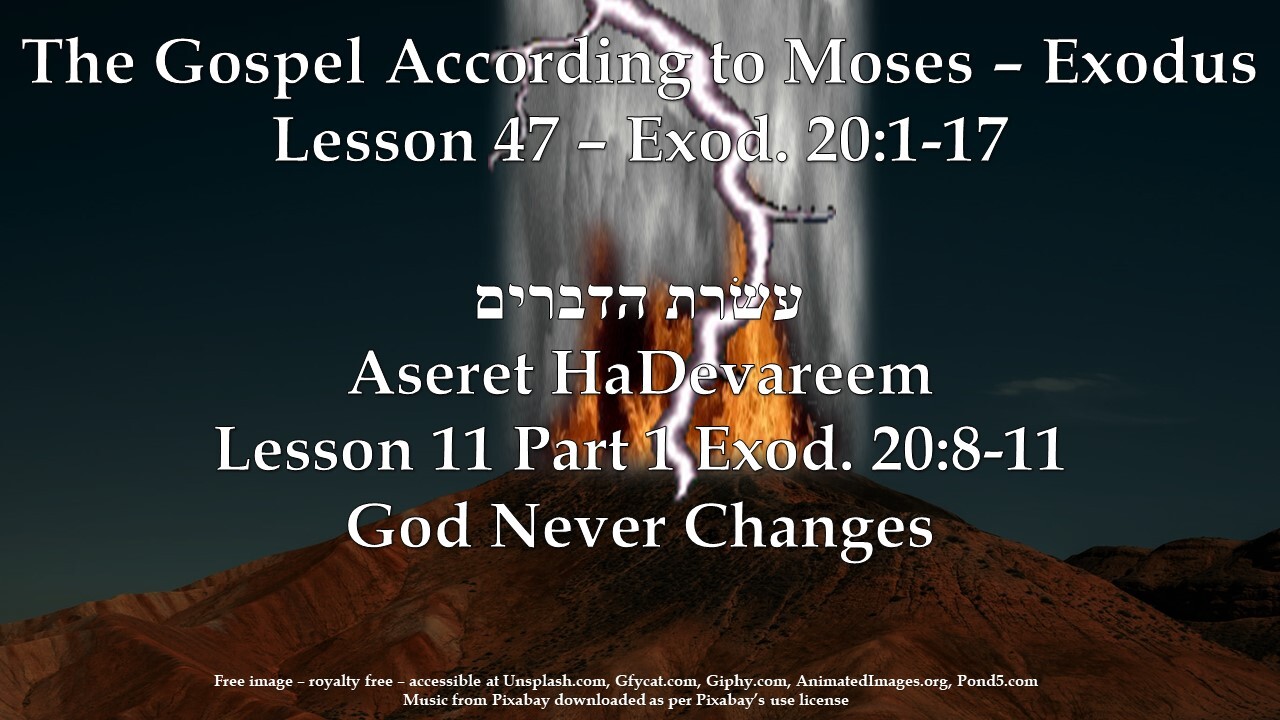
Does the Bible, specifically the New Testament, prove that Jesus changed the practices in Second Temple Judaism? Did Jesus do away with the old law, the TORAH, and start a new Sabbath on Sunday? It seems that if you study the New Testament in ENGLISH and separate it from the historical and ancient cultural context, the answer would be yes. However, the Bible was clearly meant for those first disciples like John and Mark and Matthew and Paul and Mary. God gave them His word so they understood it and passed it down to us. So, one might say they are the first audience. But, they are all Jewish, even Luke. There is a strong argument that Luke was Jewish. It isn't conclusive but very strong. Check it out at this link - https://www.levitt.com/essays/luke
Thus, these Jewish believers lived in a Jewish culture 2000 years ago and they perhaps saw things and understood things a lot differently than us. For on thing we have proof that the early church, those first believers, met for the Sabbath on Friday evening to Saturday evening.
(Paul F. Bradshaw and Lawrence A. Hoffman, The Making of Jewish and Christian Worship (Notre Dame, 1991). And,
In Video 3 we will again put the Bible in its historical context. Once again we will study His word taking in account the ancient Jewish culture of those first disciples, the first Messianic believers. When we do and study the GREEK and not the English, we find there is a compelling alternative understanding to verses that supposedly suggest Jesus changed everything. The three verses we will study are shown below take from the NASB version.
Now concerning the collection for the saints, as I directed the churches of Galatia, so do you also. On the first day of every week each one of you is to put aside and save, as he may prosper, so that no collections be made when I come. When I arrive, whomever you may approve, I will send them with letters to carry your gift to Jerusalem;
(1Co 16:1-3)
On the first day of the week, when we were gathered together to break bread, Paul began talking to them, intending to leave the next day, and he prolonged his message until midnight. There were many lamps in the upper room where we were gathered together. And there was a young man named Eutychus sitting on the window sill, sinking into a deep sleep; and as Paul kept on talking, he was overcome by sleep and fell down from the third floor and was picked up dead. But Paul went down and fell upon him, and after embracing him, he said, "Do not be troubled, for his life is in him." When he had gone back up and had broken the bread and eaten, he talked with them a long while until daybreak, and then left. They took away the boy alive, and were greatly comforted. (Act 20:7-12)
I, John, your brother and fellow partaker in the tribulation and kingdom and perseverance which are in Jesus, was on the island called Patmos because of the word of God and the testimony of Jesus. I was in the Spirit on the Lord's day, and I heard behind me a loud voice like the sound of a trumpet, saying, "Write in a book what you see, and send it to the seven churches: to Ephesus and to Smyrna and to Pergamum and to Thyatira and to Sardis and to Philadelphia and to Laodicea." (Rev 1:9-11)
This is only a short introduction. It is a deep and expansive subject that can not be completely addressed in a 40 to 60 minutes video. Thus, to continue your study on the Sabbath I strongly recommend the following books and resources ...
Kiesz, John. "A History of the Sabbath and Sunday." The Bible Sabbath Association (January 1, 1983). Free download at this link -
http://www.truthontheweb.org/KieszHistory.htm
Nichols, J. T. “The Origin of the Hebrew Sabbath.” The Old and New Testament Student, vol. 12, no. 1, 1891, pp. 36–42. JSTOR, www.jstor.org/stable/3157542
Hay, Malcolm. "THE ROOTS OF CHRISTIAN ANTI SEMITISM." Available at Amazon.
Dr. Shumel Safrai, “The Jewish People in the First Century: Historical Geography, Political History, Social, Cultural and Religious...Vols. 1 and 2.”
Bacchiocchi, Samule. "From Sabbath to Sunday. (1977)." Rome, Italy. Pontifical Gregorial University Press. Free download at this link - http://www.anym.org/pdf/from_Sabbath_to_Sunday_samuele_bacchiocchi.pdf
Encyclopedia Judaica. 1972. Keter Publishing. Jerusalem:Israel.
"Feasts and the Holidays, the Mo’edim." https://hebrew4christians.com/Holidays/holidays.html
Flusser, David. "Judaism and the Origins of Christianity." 1988. Magness Press. Jerusalem.
Hayyim, Schauss. "The Jewish Festivals." © 1938
"The Jewish Encyclopedia." www.jewishencyclopedia.com
Levine, Lee. 2005. "The Ancient Synagogue: the First Thousand Years." 2nd Edition. New Haven: Yale University Press.
Stern, David. Jewish New Testament Commentary. 1996. Jewish New Testament Publications. Clarksfield:Maryland.
Stern, David. The Complete Jewish Bible. 1998. Jewish New Testament
Wilson, Marvin. Our Father Abraham. 1989. W.B. Eerdman’s. Grand Rapids:MI. Contours of Hebrew Thought.
Finally, here's a link to a chapter of one of my books I did for my classes. The content is based upon the sources above. Link -
https://www.dropbox.com/s/qdycam9yad7ekax/e%20Lesson5..signbetweenus..2019..137..188.pdf?dl=0
A second link is related to Paul meeting in Troas on the FIRST DAY OF THE WEEK. Here's the link - https://www.dropbox.com/s/rmkqxbq18k3cmeq/SABBATH%20IN%20TROAS%20AND%20REVELATION.pdf?dl=0
Rev. Ferret - who is this guy? What's his background? Why should I listen to him? Check his background at this link - https://www.dropbox.com/s/ortnret3oxcicu4/BackgrndTeacher%20mar%2025%202020.pdf?dl=0

Monday Jul 24, 2023
Monday Jul 24, 2023
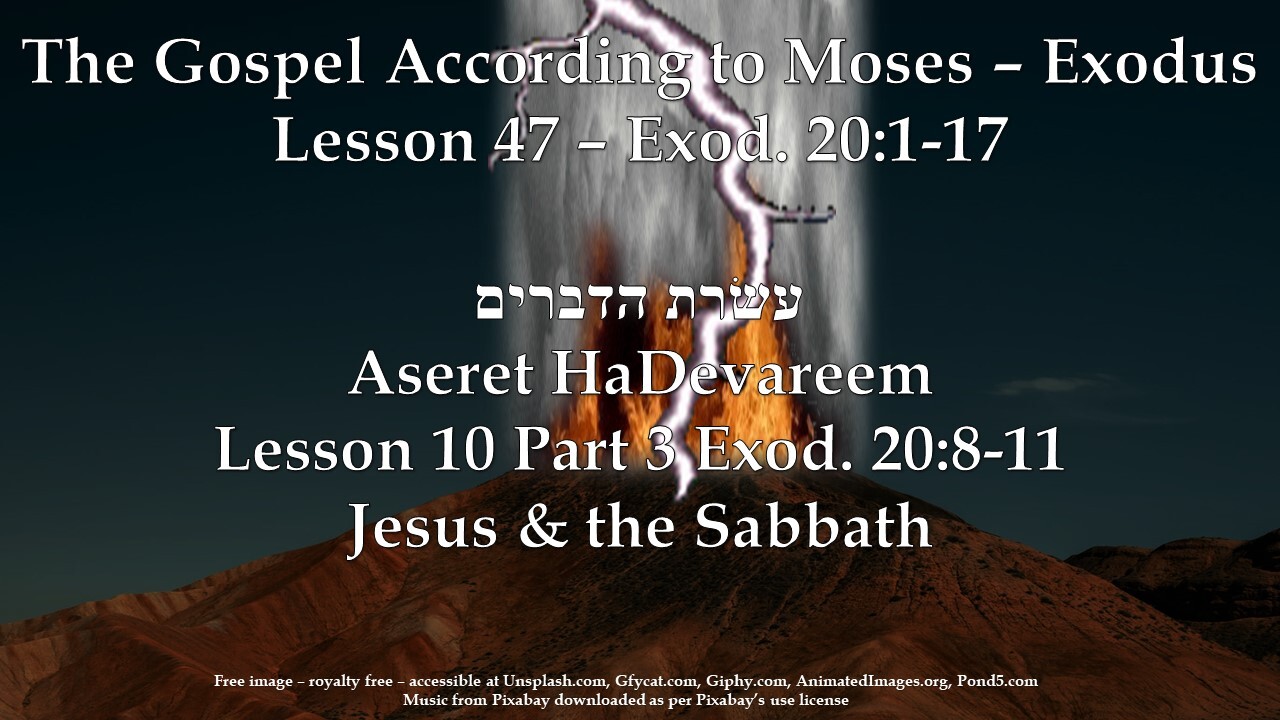
We continue with part 3 on the lesson on how is Jesus connected to Shabbat (Hebrew for the Sabbath). Jesus said all scripture testifies of Him. He said that between 24-30 A.D. and they did not have the New Testament. That means the Old Testament is all about Jesus by His own word, the very words of God. So that means the Shabbat is a feast that testifies of Yeshua. Come and join us as we study part 3 and see that Jesus is like a Shadow over the Sabbath. Maybe Sabbath will become a "bigger deal" once we see what God thinks about this.

Saturday Jul 22, 2023
Exodus - 47 Lesson 10 part 2 - Ten Commandments/Sabbath - Jesus & the Sabbath
Saturday Jul 22, 2023
Saturday Jul 22, 2023
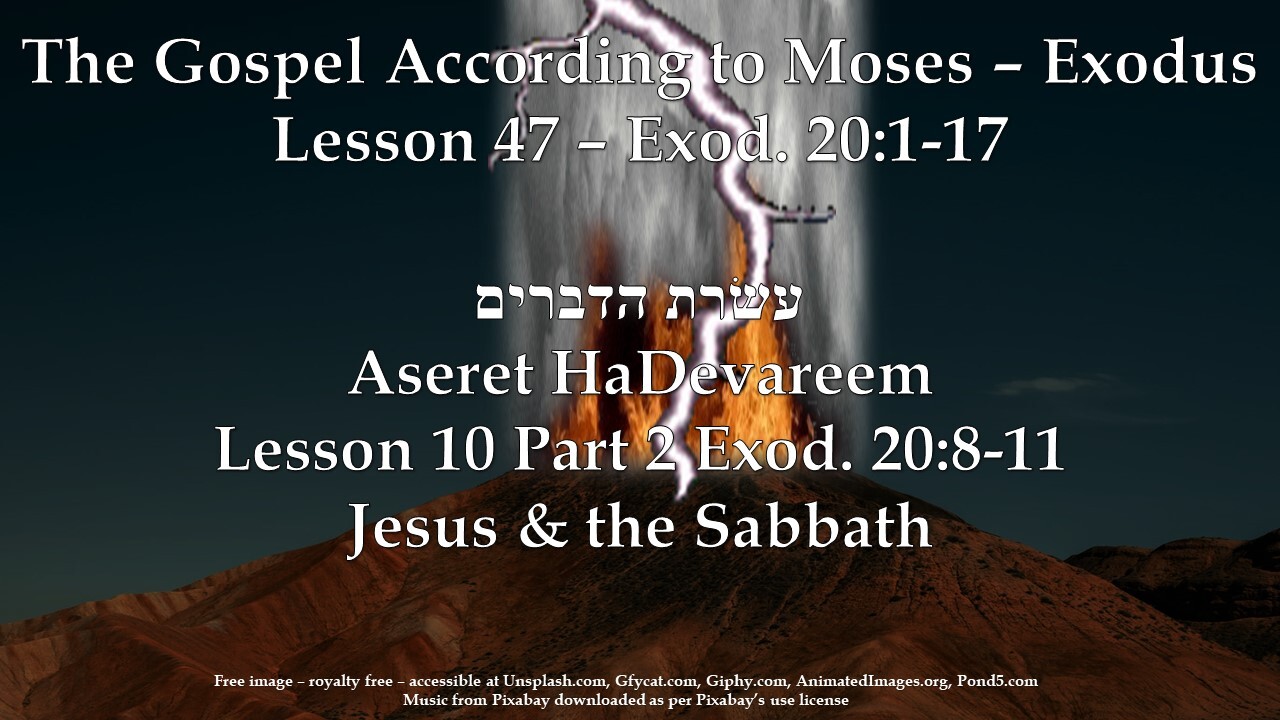

Thursday Jul 20, 2023
Exodus - 47 - Lesson 10 part 1 - Ten Commandments/Sabbath - Jesus & the Sabbath
Thursday Jul 20, 2023
Thursday Jul 20, 2023
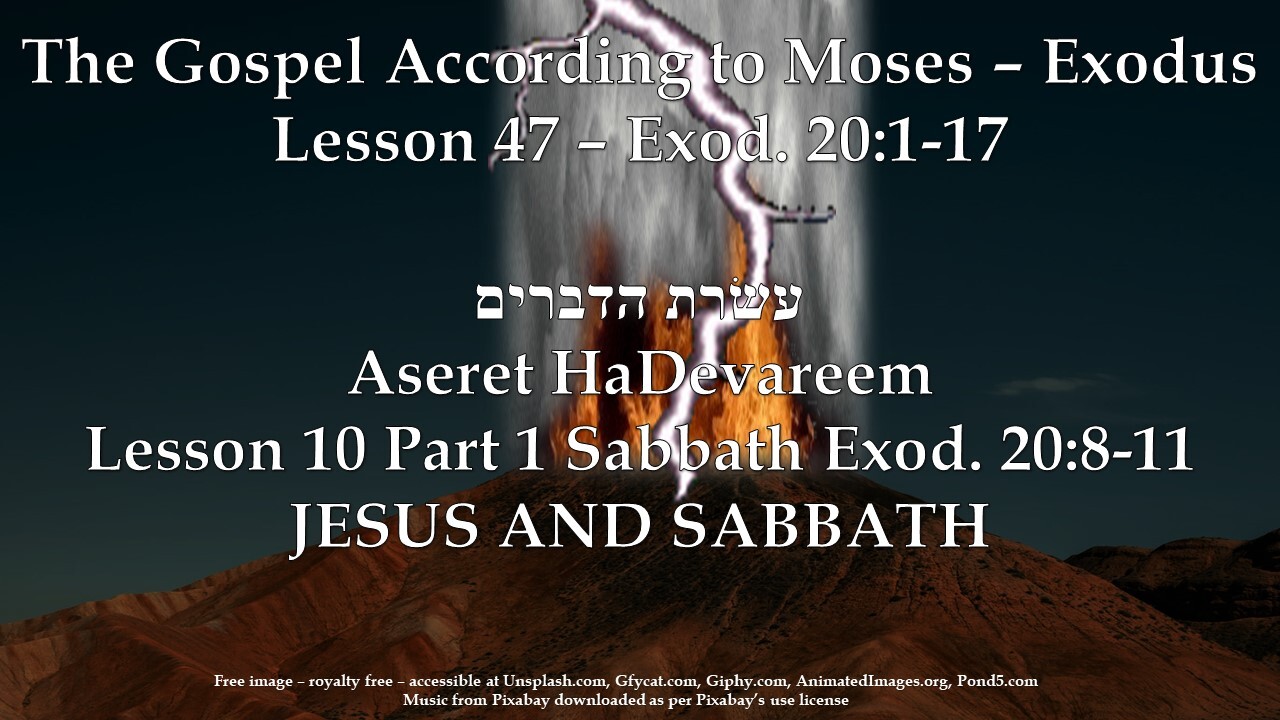
Over the last 5 to 10 years I have noticed Christians becoming interested in the Jewish Passover Meal – the Seder. Many say they see how it connects to Jesus. Christians also see how Jesus is also related to Passover. The lambs were sacrificed on the same day the Lamb of God was sacrificed or Jesus was crucified. Matter of fact I teach a course on the feasts of the Lord found in Leviticus 23 and how they testify of Jesus. Paul teaches us this. Consider the text …
Therefore no one is to act as your judge in regard to food or drink or in respect to a festival or a new moon or a Sabbath day-- things which are a mere shadow of what is to come; but the substance belongs to Christ. (Col 2:16-17)
The feasts are shadows of something. Something is casting a “shadow”over the feasts. What? Who? Jesus of course. He is the substance of the shadow or that which makes up the shadow. But, as we have seen in previous lessons, the greatest of all the Lord’s feasts, actually, appointed times set by Him, is the Sabbath, or in Hebrew, שַׁבָּת Shabbat.
God has created an appointed time called the Sabbath on the 7th day of each week. It is a holy TIME; it is 24 hours long and not about just going to church. During this set aside time, or holy time, the Lord commands us to have a special separate meeting during this 24 hour holy time as in Leviticus 23:3. The Jews do a synagogue service and from this the “church” followed suit and did a church service. But Jesus said …
“You search the Scriptures because you think that in them you have eternal life; it is these that testify about Me.” (Joh 5:39)
Jesus said this between 24-30 A.D. and all they had was the Hebrew Scriptures – a.k.a. the Old Testament. So, the Sabbath must be a SHADOW of things to come. And the Sabbath MUST testify of Jesus. But how? It is easy to “see” Jesus in Passover. It is easy to see how the Jewish Seder relates to Jesus. But שַׁבָּת Shabbat? How? How is Jesus connected to this special, set aside, or holy 24 hour period? Let’s go study this in the next three lessons. So, ready? Come let’s go.
Rev. Ferret - who is this guy? What's his background? Why should I listen to him? Check his background at this link - https://www.dropbox.com/s/ortnret3oxcicu4/BackgrndTeacher%20mar%2025%202020.pdf?dl=0

Tuesday Jul 18, 2023
Exodus - 47 - Lesson 9 part 2 - Exod. 20:8-11 THIS IS A BIG DEAL
Tuesday Jul 18, 2023
Tuesday Jul 18, 2023
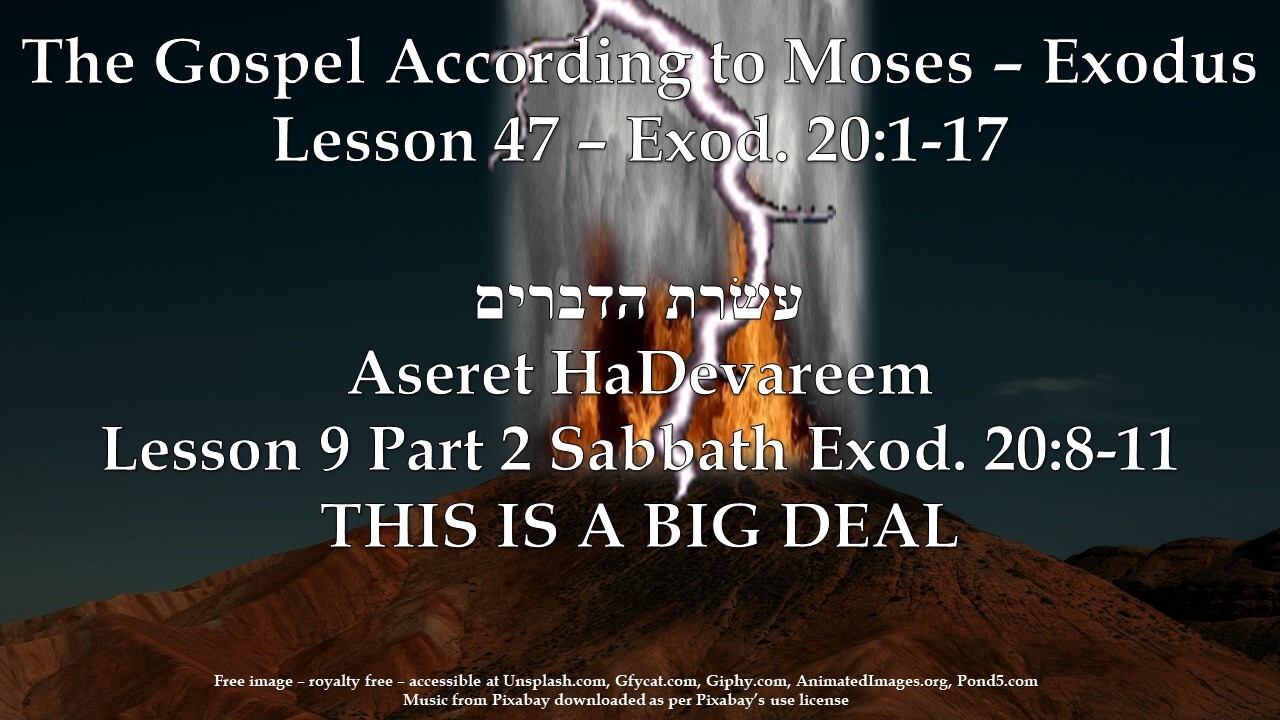
Lesson 9 Part 2
No one teaches the awesomeness of this feast, this "appointed time" of יהוה Yahvay, the Lord. Few Christians in Sunday congregations or Messianic congregations know that Shabbat is a BIG DEAL. Yes, it is a feast of the Lord by the very words of God. Don't believe me, you can read it for your self in Lev. 23:1-3 and you'll notice that the Sabbath is 1st in the list. There are 8 festivals of the Lord - they are not Jewish feasts. They belong to the Lord.
So, come. Join us. Study what you've been missing. Come and let the Lord help us understand the awesome of His שָׁבַת Shabbat so that He can enhance our walk of faith with המשיח ישוע, HaMaschiach Yeshua, Jesus the Messiah, Jesus the Christ.
Rev. Ferret - who is this guy? What's his background? Why should I listen to him? Check his background at this link - https://www.dropbox.com/s/ortnret3oxcicu4/BackgrndTeacher%20mar%2025%202020.pdf?dl=0
